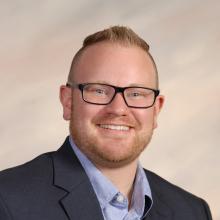Member Spotlight: Russell Toomey
Professor and Chair of Family Studies and Human Development, University of Arizona; serves on the Awards and Nominations subcommittee for the SOGIE Caucus; SCRD Equity & Justice Committee Member from 2011-2019; SECC member from 2011-2015.
What interested you in becoming a developmental scientist?
My path to becoming a developmental scientist was not a linear one! By the time I found Child and Family Studies as a choice of a major at Ohio University, I was already a college junior and was on my fourth major already. I will never forget reading a 2001 article written by Stephen Russell (who would later become my mentor) on sexual orientation-related suicide risk among adolescents – this was an assigned reading of a Death & Dying course that I was enrolled in at the time. Simultaneously, I was working as a student employee of Ohio University’s LGBT+ Student Resource Center, and reading this article made me want to understand why some adolescents who were LGBT+ experienced suicidality while others did not. I was deeply moved by the use of science to document disparities of LGBT+ adolescents, but even more so interested in the ideas that Dr. Russell posited in the discussion of the results focused on how future research should examine the strengths of adolescents with same-sex attraction. I looked at the world around me and started asking similar questions: What contributed to the resilience of LGBT+ adolescents and young adults? Why did mental health burdens continue in young adulthood for some of my LGBT+ peers and friends but not for others? All of these experiences sparked my interest in developmental science and positive youth development, in particular, among LGBT+ youth. Ultimately, I obtained my degrees in Family Studies and Human Development because I wanted to utilize science to change the “reality that doesn’t have to be” for LGBT+ adolescents, and developmental science was a logical fit given the focus on development, context, and ultimately, action.
Do you have a mentor or mentors who have been instrumental to your career and, if so, whom and how?
I have two mentors who have been extremely influential people in my life, professionally and personally: Drs. Stephen Russell and Adriana Umaña-Taylor. I had the amazing fortune of meeting both scholars at a conference in 2005 (NCFR). Dr. Stephen Russell convinced me at that conference to apply to study with him at The University of Arizona. I ultimately made the cross-country move and worked under his mentorship to receive my Ph.D. After receiving my Ph.D., I moved “up the road” to Arizona State University to work with Dr. Adriana Umaña-Taylor as part of a T32 postdoctoral fellowship. I learned under both mentors how to conduct meaningful and applied developmental science, how to ask the important questions that push the edges of our science, and how to mentor students. Both of these incredible humans are exemplar models of innovative scholars and compassionate mentors, and they continue to impact me in rich professional and personal ways still to this day!
What words of wisdom might you pass on to someone on their very first day after deciding to get a Ph.D. in developmental science or related?
Write down the reasons you applied to a Ph.D. program – these are your sparks. Throughout your program, revisit your sparks and be sure to maintain them. So much of research is the experience of rejection, whether it is peers rejecting your ideas for new research questions, a publication outlet rejecting your submitted work, or a grant/fellowship application not being funded. Rejection can sometimes dampen the sparks that represents your passion! In those moments, be sure to reflect and re-center yourself in the reasons that propelled you to get a Ph.D. For me, this has often meant trying to purposively engage or re-engage with LGBTQ+ youth in meaningful, relationship-centered ways. At the end of the day, LGBTQ+ youth are the reason why I do what I do; sometimes all it takes is just spending an hour with them during a busy week to remind myself that it is worth it to persevere.
Who inspires you?
Throughout my life, I’ve received inspiration from many different people. I attended a social justice focused meditation and compassion retreat last summer, and there were several guided meditations focused on building strength and compassion from our ancestors. It was during those meditations that I really focused on the strength, courage, and humanity of my trans elders and ancestors. Many of these individuals were never able to share their authentic selves with the world around them or have themselves reflected back to them in authentic ways. Those who were able to share their authentic selves often experienced horrific violence and even death. I am inspired every day by their strength and courage that created the possibility for me to be an out transgender, pansexual professor.
What does the SOGIE Caucus mean to you?
Representation matters. Seeing oneself reflected in a society matters. The SOGIE Caucus, albeit just a few years old now, allows LGBTQ+ researchers to see themselves represented in the SRCD organization. This representation also allows one to find connection, legitimization, and support. It wasn’t until I was an assistant professor that I finally met another out, transgender professor (not in the same discipline, unfortunately). Until then, I had been creating my own path without being able to see myself truly reflected back in my professional spaces. The SOGIE Caucus allows for that mirroring to happen: LGBTQ+ scholars, regardless of career level, can now create connection, mentoring relationships, and support with other LGBTQ+ scholars who engage in developmental science. The mere presence of the SOGIE Caucus of SCD is a game-changer for LGBTQ+ scholars.
